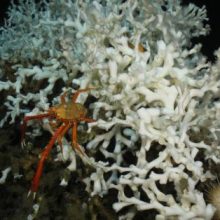Source: Huffington Post
Author: Dr Lisa Levin
Many of us know that most of planet Earth is covered with ocean — about 70 percent. We probably should have been named planet Ocean. But how many know that most of our planet is covered with deep ocean? That ocean waters deeper than 200 meters (656 feet) cover about two-thirds of the surface of the planet and more than 95 percent of the habitable volume? Most of this vast area is unexplored. We know less about the bottom of the ocean than we do about the surface of the moon, and as a result, most of the biological species in the ocean remain undiscovered.

This has not prevented us humans from exploiting resources in the ocean, however. We are fishing increasingly deeper, with bottom trawls and long lines that upend and destroy life on the sea floor. Slow-growing deep-sea fishes are often more than 100 years old and their removal is more like permanent extraction (serial mining) than fishing a replaceable resource. Our oil and gas are being extracted from deeper and deeper waters. Deep oil rigs that can reach 2000-3000 meters (6,500-9,800 feet) are the new normal — though not without hazard, as we have learned from the Deepwater Horizon accident and other blowouts. Industry is now preparing to extract minerals from a host of different deep-sea ecosystems — nickel, cobalt, copper, zinc, and rare earth elements from nodules in the abyss and seamounts, and gold, silver, lead, zinc, and copper from sulfides at hydrothermal vents.
Ironically, it is our advanced economies and green lifestyles, filled with electronics, cell phones, hybrid-car batteries, solar cells, and wind turbines that create demand for the minerals mentioned above, driving interest in mining the deep sea.
For more, go to: http://www.huffingtonpost.com/dr-lisa-levin/compromising-the-ecology-of-the-deep_b_8155652.html?fb_action_ids=1000238783329908&fb_action_types=og.likes

